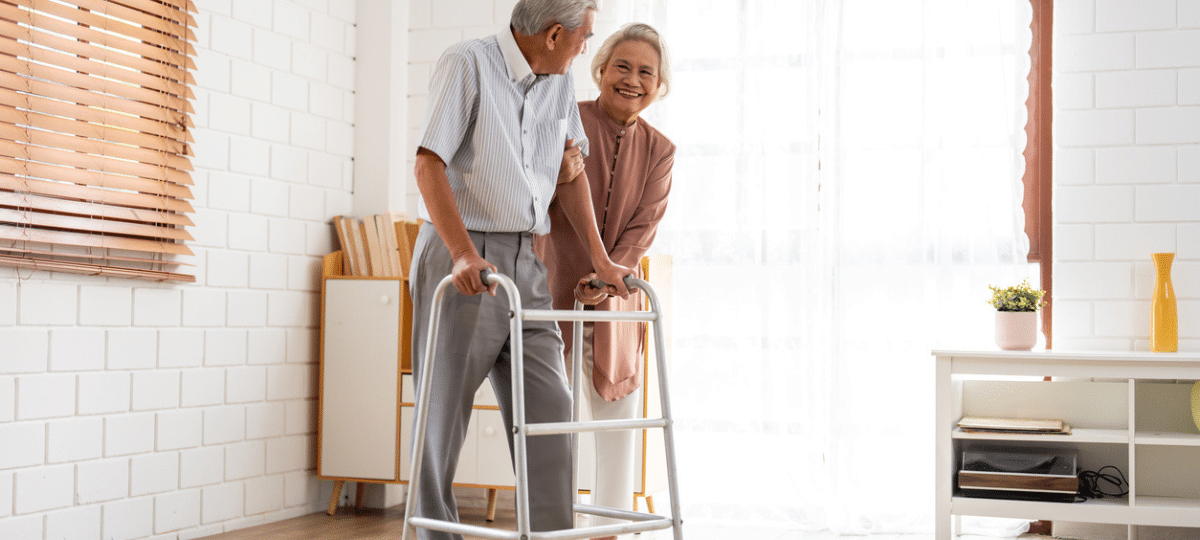As we get older, our muscles naturally get weaker – and this includes the muscles we use to breathe. This can make it more challenging for us to walk, perform simple tasks, and yes, even breathe comfortably. If you’ve noticed breathing feels a bit harder than it used to, you’re not alone. Breathing difficulties are quite common in seniors.
The good news? There are simple breathing exercises and lifestyle changes that can help you breathe easier and improve other aspects of your health as well. Most of us don’t think much about our breathing until we notice we need to – but taking action now can make a real difference in how you feel every day.
Benefits of Healthy Breathing
When you breathe easier, you’ll likely notice improvements in many areas of your life. Better breathing can help reduce stress and anxiety, support healthy digestion, decrease the frequency of headaches, and help you enjoy more restful sleep.
There’s something particularly refreshing about breathing deeply in nature – whether it’s your backyard garden or a local park. Fresh, clean air can help relieve stress, lift your mood, and boost your overall health. Just make sure you choose areas away from pollution, car exhaust, or cigarette smoke to get the full benefit.
Healthy Lung Habits
Breathing Exercises
Before you start any new breathing routine, it’s always wise to check with your healthcare provider, especially if you have existing health conditions that might be affecting your breathing.
Deep Breathing
Here’s a simple technique you can try right now: Sit comfortably with your back straight and your feet flat on the floor. Take a slow, deep breath in until your lungs feel comfortably full, then exhale slowly and completely, imagining you’re releasing all the stale air from your lungs.
You can also try breathing in through your nose and out through your mouth – many people find this pattern particularly relaxing. Take your time with each breath, and when you inhale, try holding it for just a few seconds before letting it go. Even just a few minutes of this focused breathing each day can make a difference.
Pay attention to how you’re breathing throughout the day too. When we’re stressed or anxious, we often take quick, shallow breaths that can actually make us feel more lightheaded and tense. Catching yourself doing this and switching to slower, deeper breaths can be surprisingly helpful.
Regular Exercise
Staying active is one of the best investments you can make at any age. Whether you enjoy a daily walk around the neighborhood, gentle yoga in your living room, or pedaling a stationary bike while watching your favorite show, regular movement helps raise your heart rate, expand your lung capacity, and keep your muscles strong.
The beauty of exercise is that it doesn’t have to be complicated or intense. Swimming laps, dancing to your favorite music, tending to your garden, or any activity that brings you joy can significantly improve your breathing abilities. When your muscles stay strong, breathing becomes easier too.
Avoid Smoke and Pollution
While most public places are now smoke-free, it’s still important to steer clear of secondhand smoke whenever possible. Even walking through a cloud of smoke outside a building can irritate your lungs, so try to take a different path or hold your breath briefly when you can’t avoid it.
Pollution from traffic and other sources is trickier to avoid, but these airborne irritants and toxins can be particularly hard on aging lungs. If you live in an area with heavy traffic or industrial pollution, consider timing your outdoor activities for when air quality is better, or even wearing a mask during high-pollution days.
If you’re still smoking, now is an excellent time to quit. Your healthcare provider can offer you proven strategies and support to help you succeed. Remember – it’s never too late to start healing your lungs.
Healthy Diet
What you eat plays a bigger role in lung health than you might think. Focus on filling your plate with plenty of fresh fruits and vegetables, lean proteins, and foods packed with antioxidants. As we age, we often find we don’t need to eat as much as we used to, which makes every bite count even more.
Leafy greens like spinach and kale, beans and legumes, and a variety of whole grains will help keep your entire body – including your lungs – functioning at its best. Try to limit processed and fatty foods that are harder for your body to digest and can contribute to inflammation.
Stay Hydrated
Drinking enough water is crucial for keeping your lungs and all your organs working properly. Unfortunately, many seniors don’t get enough fluids, sometimes due to concerns about bladder control or simply forgetting to drink regularly.
Here’s the thing – staying hydrated is too important for your lung health to skip. You can work around bathroom concerns by timing your fluid intake and still maintain your active lifestyle.
Starting your morning with a glass of warm water is a wonderful way to get your system going and keep everything well-lubricated. Warm water moves through your body more efficiently and helps keep your entire system functioning smoothly.
Building Your Lung Health Strategy
If you or a loved one lives independently, you might want to consider a medical alert system. Knowing that help is available at the touch of a button can be especially reassuring if breathing difficulties or other health concerns arise unexpectedly.
By incorporating these lung health strategies into your routine, along with having reliable emergency support when you need it, you’re setting yourself up for more comfortable breathing and greater confidence in your independence.




